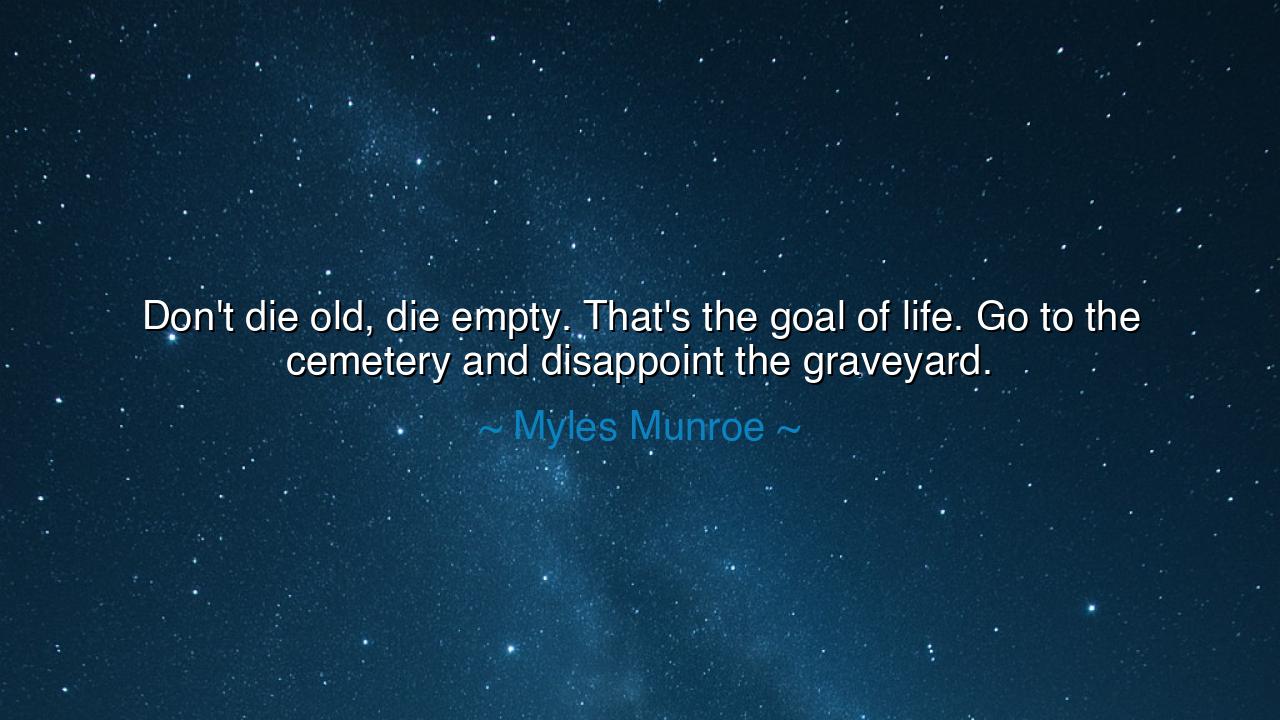
Don't die old, die empty. That's the goal of life. Go to the
Don't die old, die empty. That's the goal of life. Go to the cemetery and disappoint the graveyard.






The words of Myles Munroe, “Don’t die old, die empty. That’s the goal of life. Go to the cemetery and disappoint the graveyard,” are not gentle suggestions but a cry of urgency, like a trumpet sounding before battle. They awaken the soul to the truth that the measure of life is not found in years lived, but in gifts given, visions fulfilled, and purpose poured out. To die empty is to leave this world having released all that was within you—every idea, every talent, every dream, every ounce of love and service—so that the grave receives nothing that should have been shared with the living.
To die old is simple; it is merely to survive the passage of years. But to die empty is rare; it is the labor of a soul that refuses to hoard potential. The graveyard is filled with unwritten books, unsung songs, unspoken truths, and unlived dreams. Munroe’s call is a fierce challenge to deny the grave such treasures. He urges us to “disappoint” the graveyard by giving to life everything we have, so that when our time comes, we depart having already sown our seeds into the soil of history.
The ancients knew this call. The warriors of Sparta did not measure life by length of days, but by courage spent. They would rather die on the battlefield than return home with unused valor. Likewise, philosophers such as Marcus Aurelius urged men to live each day as though it were their last, wasting nothing of their inner strength. Munroe stands in this same lineage of wisdom, proclaiming that the tragedy is not death itself, but dying with unfulfilled purpose still locked inside.
History bears witness. Consider Leonardo da Vinci, who filled the world with art, invention, and knowledge. Though he left unfinished works, his life was not a story of wasted potential, but of tireless giving. In contrast, there are countless names lost to history—those who carried genius but never acted, who dreamed greatly but feared too much. Their silence is heard only in the graveyard, where possibility was buried with their bones. Munroe’s words remind us that we are not called to such a fate.
The heart of this teaching is fiery: life is a trust, not a possession. What is placed within us is not for us alone. The vision, the creativity, the strength—all are meant to be given away, to enrich others and transform the world. To hold back is to betray the gift; to give fully is to honor the One who gave it. Dying empty does not mean exhaustion without meaning—it means fulfillment, completion, the satisfaction of a vessel poured out until nothing is wasted.
The lesson for us is clear: do not postpone your purpose. Do not bury your talents in fear, waiting for tomorrow. Act now. Write the words that burn in your heart, speak the truth that waits on your tongue, serve those in need, create beauty, pursue justice. Refuse to allow the grave to steal what only the living can receive. Respect your life by emptying it fully into the service of your generation.
Practical actions follow. Begin each day asking: “What gift within me must be given today?” Make a list of the dreams, talents, or ideas you have carried silently, and choose one step to bring them into light. Mentor others, for wisdom unshared dies with you. Create without fear of imperfection, for even flawed creation is better than none. And live with urgency, remembering that time is not endless. The grave waits for all—but let it wait in disappointment, empty-handed, denied the treasures you gave to the world.
Thus Munroe’s words endure like a solemn command: “Don’t die old, die empty. That’s the goal of life. Go to the cemetery and disappoint the graveyard.” Let them echo in your heart, not as mere inspiration, but as a law of life. For the measure of a soul is not how long it dwells upon the earth, but how fully it leaves itself behind—poured out, spent, yet victorious. To die empty is not defeat; it is the final triumph of a life that gave everything it was meant to give.






AAdministratorAdministrator
Welcome, honored guests. Please leave a comment, we will respond soon